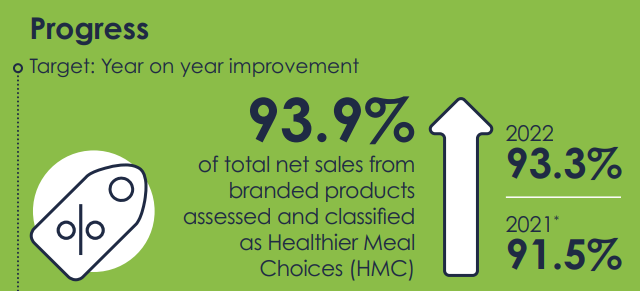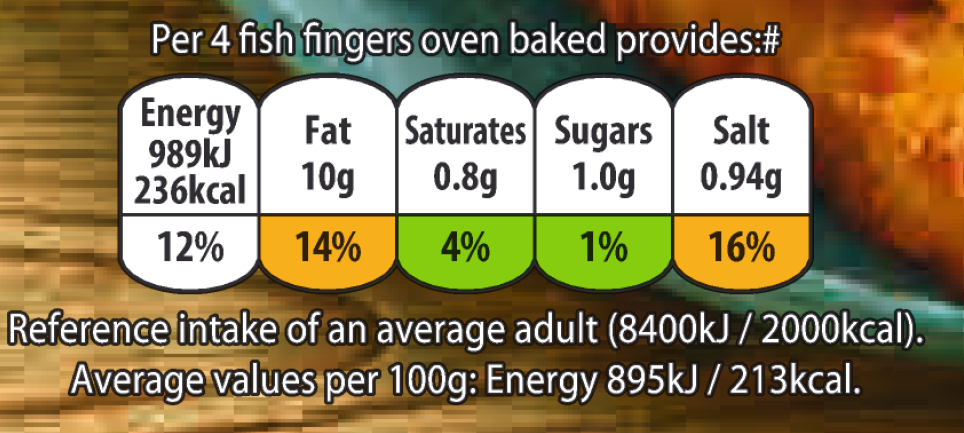13 June 2024
Lobbying for Good: Why we need regulation to level the playing field for the food industry

Our Business Engagement Manager Chloe Mackean sat down with Lauren Woodley, Senior Nutrition Manager at Nomad Foods, to hear about what their priority policy asks are for the new Government.
Mandatory reporting on healthy food sales and committing to the HFSS advertising and promotion restrictions were high up on their wish list. Underpinning these specific policies, what Nomad Foods really need from the new Government is regulation that will level the playing field for the food industry. Lauren explained how well-designed policies that have realistic timeframes will ultimately reduce the uncertainty amongst businesses. As Lauren explains “uncertainty and confusion can mean that from an industry point there is a nervousness, and that’s never a good place to be if you’re trying to create change or something positive”.
First movers shouldn’t be penalised
Political flip-flopping on the HFSS restrictions legislation is one example where the business has been negatively affected.
When the government first announced the HFSS promotions and placement restrictions their Goodfella’s pizza range was 40% non-HFSS. The food manufacturer invested a huge amount of time and resource into making it 100% non-HFSS.

When the UK Government announced that they would be delaying implementation of the volume-based restrictions from 2023 to 2025 there was frustration and concern that further delays could be announced.
Because of the delay, companies like Nomad Foods who have invested heavily in transitioning their portfolio towards healthier foods and taken risks to deliver HFSS compliant products have seen minimal commercial competitive advantage over companies who took no positive action.
There was also a lot of uncertainty around the HFSS placement restrictions. Right up until the day before the legislation came into effect there was still conjecture that the rules would be scrapped.
Nomad Foods have thousands of products and SKUs and Lauren explains that it takes time for them to be reformulated and for new healthy innovations to be launched.
Uncertainty around policies creates confusion within the business which in turn can lead to loss of engagement and buy-in.
Not only has the policy flip-flopping cost resources and eroded confidence, but the legislation was ill-designed at the outset because of the insufficient funds allocated to enforce it.
Nomad Foods asks for a commitment that the HFSS placement, promotion and advertising restrictions will come into effect across the UK in October 2025, and for a secondary commitment that sufficient funding and resource to enforce the legislation are allocated.
Introduce mandatory reporting and disclosure to level the playing field
Similarly to the HFSS restrictions, the Food Data Transparency Partnership (FDTP) is something that the business would like to see the new Government continuing to develop, with a greater ambition on transparency amongst the food industry.

For those that don’t know, the FDTP is a partnership between Government, industry and experts, aiming to improve the availability, quality and comparability of data in the food supply chain.
Nomad foods sits on the Health Working Group for the FDTP and along with a group of other food companies, has invested time and effort to try and develop a cohesive set of reporting metrics for the food industry.
“We are supportive of the FDTP however we would like to see the new Government go further than the existing scope and evolve the FDTP to make health reporting mandatory for companies above a certain size” Lauren states.
“We also want the new Government to require each of these companies to publish targets to increase healthiness of sales and publicly report on this."
Lauren goes on to explain why business transparency is so effective at driving change within a business: "Transparency is the key for industry looking to unlock all the different levers they can pull on to improve the healthiness of what’s eaten by consumers.
"Transparency leads to pressure, whether that’s positive pressure because you want to report better numbers or negative pressure because you have a low baseline.
"Those pressures will trickle down into actions. If you have sales-linked reporting then it’s not only going to affect the way in which you develop products, but it’s going to also affect the way you promote and advertise products.
"Because, as we know, promotion and advertising generally increases purchase. If you’re trying to change the shape of your sales then you’re going to draw on all the levers that you can."
Other easy to implement nutrition policies
Another priority ask for the new Government is to establish their support for the Nutrient Profiling Model as the basis of health policy.
This is something that could be easily done in the first 100 days of new Government and would quickly establish clarity and confidence amongst the food industry.

The Nutrient Profiling Model is already widely used by food industry and is a tool to meaningfully deliver healthier food.
"We’d also like to see the new Government make front of pack nutrition labelling mandatory”, Lauren says.
"This is something that would be relatively simple to do, but would take time, and we’d like to see this come in over the course of the new Government."
Recommended voluntary Multiple Traffic Light Labelling exists in the UK, which Nomad Foods uses across all of its UK brands, however the Government should come to a view on implementing mandatory front of pack nutrition labelling.
In summary, Nomad Foods’ key policy asks of the new Government are:
- Commit that the HFSS placement, promotion and advertising restrictions will come into effect across the UK in October 2025, and that sufficient funding and resource to enforce the legislation are allocated.
- Evolve the FDTP to make health reporting mandatory for food businesses above a certain size and for these businesses to publish healthier sales targets and report on them annually.
- Continue to base health policy on the UK Government endorsed Nutrient Profiling Model
- Make front of pack nutrition labelling mandatory for businesses of all sizes
- Other asks of Government are to commit to timings for the next batch of salt targets and commit to updating, and then promoting the updated, Eatwell Guide.
About our Lobbying for Good blog series:
There are a growing number of food companies and investors who want Government to take a more proactive role in helping them deliver on their health and sustainability strategies. As we approach the general election, it is important to give those businesses and investors a platform and help to amplify their asks of Government.
In this blog series, The Food Foundation aims to highlight progressive voices within the food industry who - at the time of interview - we have identified as being leaders on specific areas within health and sustainability. We ask them what their vision is for a healthy and sustainable food system post-election and what specific actions the new Government should take in its first 100 days.
We hope their commitment to creating a fairer and more sustainable food system will continue into the future and that these blogs will inspire other business leaders to add their voices to the call for the new Government to regulate for positive change.

About Lobbying For Good
A growing number of food companies and investors want Government to take a more proactive role in helping them deliver on their health and sustainability strategies. As a new Government takes office, it's important to give those businesses and investors a platform and help to amplify their asks of policymakers.
In this blog series, we aim to highlight progressive voices within the food industry who - at the time of interview - we've identified as being leaders on specific areas within health and sustainability. We ask them what their vision is for a healthy and sustainable food system post-election and what specific actions the new Government should take in its first 100 days.
We hope their commitment to creating a fairer and more sustainable food system will continue into the future and that these blogs will inspire other business leaders to add their voices to the call for the new Government to regulate for positive change.


Chloe joined the team in August 2020 as Global Food Systems Project Manager, leading on The Food Foundation’s international work in the run up to the UK hosting COP26 and the UN Food Systems Summit. She is now the Business Engagement Manager, working with food businesses to encourage them to improve the healthy and sustainability of their portfolios. Before joining us, Chloe worked for the National Trust within the External Affairs team. During her time there she set up a knowledge sharing network for climate change professionals called 'Fit for the Future'. She also spent a year managing an organic farm and sustainability centre.




